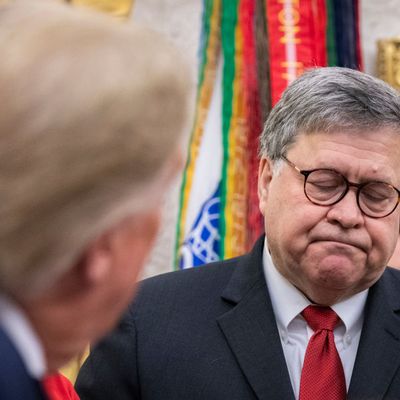
Since it’s been a few months — and at least one presidency-defining international scandal — since President Trump’s last presidency-defining international scandal, let’s review the behavior of Attorney General William Barr regarding Russian interference in the 2016 election.
Foremost, Barr’s creative interpretation of the Mueller report shielded Trump from clear examples of obstruction of justice, leading to the president’s false claim of “complete and total exoneration.” Aside from that bail-out, he also called the Mueller investigation into potential obstruction a “political operation to overthrow the president;” claimed that the FBI was “spying” on Trump; had multiple conversations with White House lawyers prior to the report’s release benefitting the president’s cause; and compared the Russia investigation to the racist birther movement, although it was forwarded primarily by Trump.
In light of the attorney general’s past actions safeguarding the president from accountability for his campaign’s conduct, it’s no surprise that Barr continues to trust Trump’s word over findings from a Department of Justice investigation. According to the Washington Post, Barr privately disagrees with the DOJ Inspector General Michael Horowitz’s determination that the FBI had enough information to open an inquiry into the Trump campaign in July 2016. The IG report on the origin of the investigation, which will be released next week, is expected to find that the FBI was justified in its investigation, which was opened after Trump aide George Papadopoulos spilled that Moscow had hacked Clinton emails prior to the announcement that DNC servers were compromised by Russian assets.
As the Post notes, it’s common for an AG to disagree with an element of an inspector general’s report, but “typically those disagreements occur because senior leaders at the department believe the inspector general has been too critical. In this case, Barr has conveyed to others his belief that Horowitz has not been critical enough, or is at least reaching a conclusion prematurely.” And as the paper puts it, perhaps a little too mildly, the image of the attorney general “suggesting the FBI may have wrongly opened an investigation into a presidential campaign, even after the inspector general announces they were justified in doing so, will probably generate more partisan battles over how the Justice Department and the FBI operate.”
Other “partisan battles” are likely to arise over another DOJ determination moving into the election year. According to a Politico report, Barr will have to determine how to navigate a “potential criminal probe” into the Trump administration’s actions in Ukraine. Barr, who has already undermined the credibility of the historically independent department, may soon have to determine if the Department of Justice will actually seek justice in this critical instance. Past examples of the attorney general’s diligence may prove prescient.






























